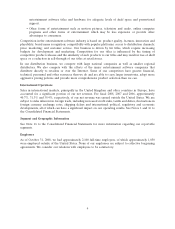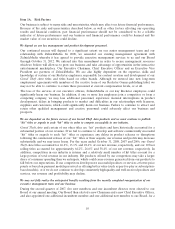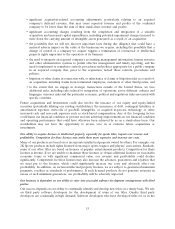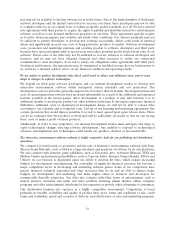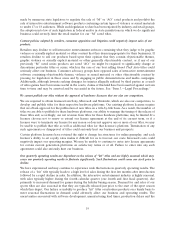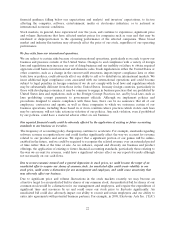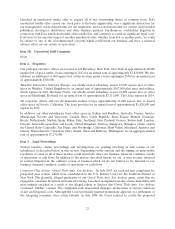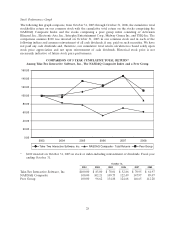2K Sports 2008 Annual Report Download - page 29
Download and view the complete annual report
Please find page 29 of the 2008 2K Sports annual report below. You can navigate through the pages in the report by either clicking on the pages listed below, or by using the keyword search tool below to find specific information within the annual report.made by numerous state legislators to regulate the sale of ‘‘M’’ or ‘‘AO’’ rated products and prohibit the
sale of interactive entertainment software products containing certain types of violence or sexual materials
to under 17 or 18 audiences. While such legislation to date has been enjoined by industry and retail groups,
the adoption into law of such legislation in federal and/or in state jurisdictions in which we do significant
business could severely limit the retail market for our ‘‘M’’ rated titles.
Content policies adopted by retailers, consumer opposition and litigation could negatively impact sales of our
products.
Retailers may decline to sell interactive entertainment software containing what they judge to be graphic
violence or sexually explicit material or other content that they deem inappropriate for their businesses. If
retailers decline to sell our products based upon their opinion that they contain objectionable themes,
graphic violence or sexually explicit material or other generally objectionable content, or if any of our
previously ‘‘M’’ rated series products are rated ‘‘AO,’’ we might be required to significantly change or
discontinue particular titles or series, which in the case of our best selling Grand Theft Auto titles could
seriously affect our business. Consumer advocacy groups have opposed sales of interactive entertainment
software containing objectionable themes, violence or sexual material or other objectionable content by
pressing for legislation in these areas and by engaging in public demonstrations and media campaigns.
Additionally, although lawsuits seeking damages for injuries allegedly suffered by third parties as a result
of video games have been unsuccessful in the courts, claims of this kind have been asserted against us from
time to time and may be asserted and be successful in the future. See ‘‘Item 3.—Legal Proceedings.’’
We cannot publish our titles without the approval of hardware licensors that are also our competitors.
We are required to obtain licenses from Sony, Microsoft and Nintendo, which are also our competitors, to
develop and publish titles for their respective hardware platforms. Our existing platform licenses require
that we obtain approval for the publication of new titles on a title-by-title basis. As a result, the number of
titles we are able to publish for these hardware platforms, our ability to manage the timing of the release of
these titles and, accordingly, our net revenue from titles for these hardware platforms, may be limited. If a
licensor chooses not to renew or extend our license agreement at the end of its current term, or if a
licensor were to terminate our license for any reason or does not approve one or more of our titles, we may
be unable to publish that title as well as additional titles for that licensor’s platform. Termination of any
such agreements or disapproval of titles could seriously hurt our business and prospects.
Certain platform licensors have retained the right to change fee structures for online gameplay, and each
licensor’s ability to set royalty rates makes it difficult for us to forecast our costs. Increased costs could
negatively impact our operating margins. We may be unable to continue to enter into license agreements
for certain current generation platforms on satisfactory terms or at all. Failure to enter into any such
agreement could also seriously hurt our business.
Our quarterly operating results are dependent on the release of ‘‘hit’’ titles and are highly seasonal which may
cause our quarterly operating results to fluctuate significantly. Such fluctuations could cause our stock price to
decline.
We have experienced and may continue to experience wide fluctuations in quarterly operating results. The
release of a ‘‘hit’’ title typically leads to a high level of sales during the first few months after introduction
followed by a rapid decline in sales. In addition, the interactive entertainment industry is highly seasonal,
with sales typically higher during the fourth calendar quarter (our fourth and first fiscal quarters), due
primarily to increased demand for games during the holiday buying season. Demand for and sales of our
sports titles are also seasonal in that they are typically released just prior to the start of the sport season
which they depict. Our failure or inability to produce ‘‘hit’’ titles or introduce products on a timely basis to
meet seasonal fluctuations in demand could adversely affect our business and operating results. The
uncertainties associated with software development, manufacturing lead times, production delays and the
19


